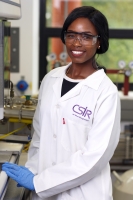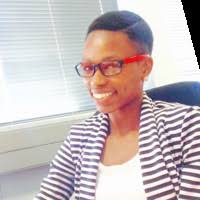About Mpho Mogaswane
Mpho Mogaswane, is a PhD candidate focusing on engineering defects in Metal Organic Frameworks in order to improve their hydrogen storage functionality.

Mpho Mogaswane
Tell us about yourself – A brief biography on your place of birth, educational history (high school and higher institution), work etc…
I was born in Polokwane and grew up in Benoni. I am the third of four children in my family. I attended high school at St Francis College in Benoni. I then furthered my education at Rhodes University, where I started my career in science. I majored in chemistry, statistics and biochemistry, and then further went on to do honour’s and master’s degrees in nanotechnology under the supervision of Prof. Tebello Nyokong. I graduated with my master’s degree in 2013 and started looking for a job. Having no luck in finding a job, I applied for a studentship at CSIR for a PhD in Material Science. I have been pursuing my PhD since late 2015 to date with Stellenbosch University under the supervision of both Prof Len Barbour and Prof Jianwei Ren.
Why did you choose this career path and what influenced you to pursue it?
In all honestly, I believe it chose me. In grade 10, we had to decide whether we wanted to study accounting or science. St Francis College is a small private school and it didn’t offer many subject opportunities. Everyone seemed to be afraid of choosing science and the whole grade ended up choosing accounting. We then realised this would get us into trouble and a group of us decided to give science a chance. I was one of those in that group. I learnt to love science and started understanding it better.
At present, what are you working on?
I am part of the HySA Catalysis team in Mintek that is working on the development of fuel cell catalysts. My project is focussed on the development of non-carbon supports for the platinum catalyst and investigating different platinum nano alloys that can be used instead of pure platinum as a fuel cell catalyst.
What average marks in matric (maths and science) are required to study this degree in university?
One needs to have at least 60% in maths and science but if you score less than that there is a foundation phase where you take an extra year to complete your degree. I know a lot of successful scientists who started their career under this foundation phase.
Did you always intend to be a scientist, if not, what was your dream career?
I didn’t intend to be a scientist. Initially I wanted to be a Charted Accountant.
At present, what are you working on?
I have just submitted my thesis for my PhD. My work was on engineering defects in Metal Organic Frameworks in order to improve their hydrogen storage functionality. I was based at Hydrogen South Africa (HySA) in the CSIR.
What is your opinion on female representation in the energy or renewable energy industry?
Adopting a gender perspective to the development of renewable energy is critical to ensuring that women’s contributions – their skills and opinions – are an integral part of the growing industry. Increased engagement among women expands the pool of talent for the renewables sector. Greater gender equity, moreover, also provides significant co-benefits. Also, research shows that women introduce fresh experiences into the workforce and improve teamwork, thus growing the number of skilled women in leadership in a company produces improved internal results.
What is the biggest challenge you have encountered so far in your journey as a scientist and how did you overcome it?
It is impossible to do science if there is a lack of instrumentation. I experienced this a lot in my PhD and it affected the time it took to complete my degree. It is important to build a good network of people and collaborations in order to assist each other with such problems.
Which undergraduate degree should someone enrol in, in order to become a specialist in your field?
They should enrol in a Bachelor of Science degree, and they can major in any subject they are interested in e.g. zoology, chemistry etc.
Share a turning point or defining moment in your work as a scientist?
Currently the most defining moment for me is publishing new work. All the efforts and work that goes into publishing a scientific paper makes one feel triumphant when that paper is published. I also look forward to producing a patent. Science is about being innovative and thinking outside of the box.
What is your advice to young, aspiring female scientists and students?
Be bold and stand out. Believe in your ideas and never under-estimate yourself. Network and collaborate to build your network, learn from other women in science who have been in the field for longer. You can be wherever you see yourself, but it all requires determination and hard work.
What is your next move career wise and what are you most looking forward to?
After doing research for close to 10 years, I would like to move into industry and put theory into practice. With funds available I would like to open a chemical manufacturing lab/company. I would like to produce crystalline dyes called Phthalocyanines for use in water treatment and photodynamic therapy.


